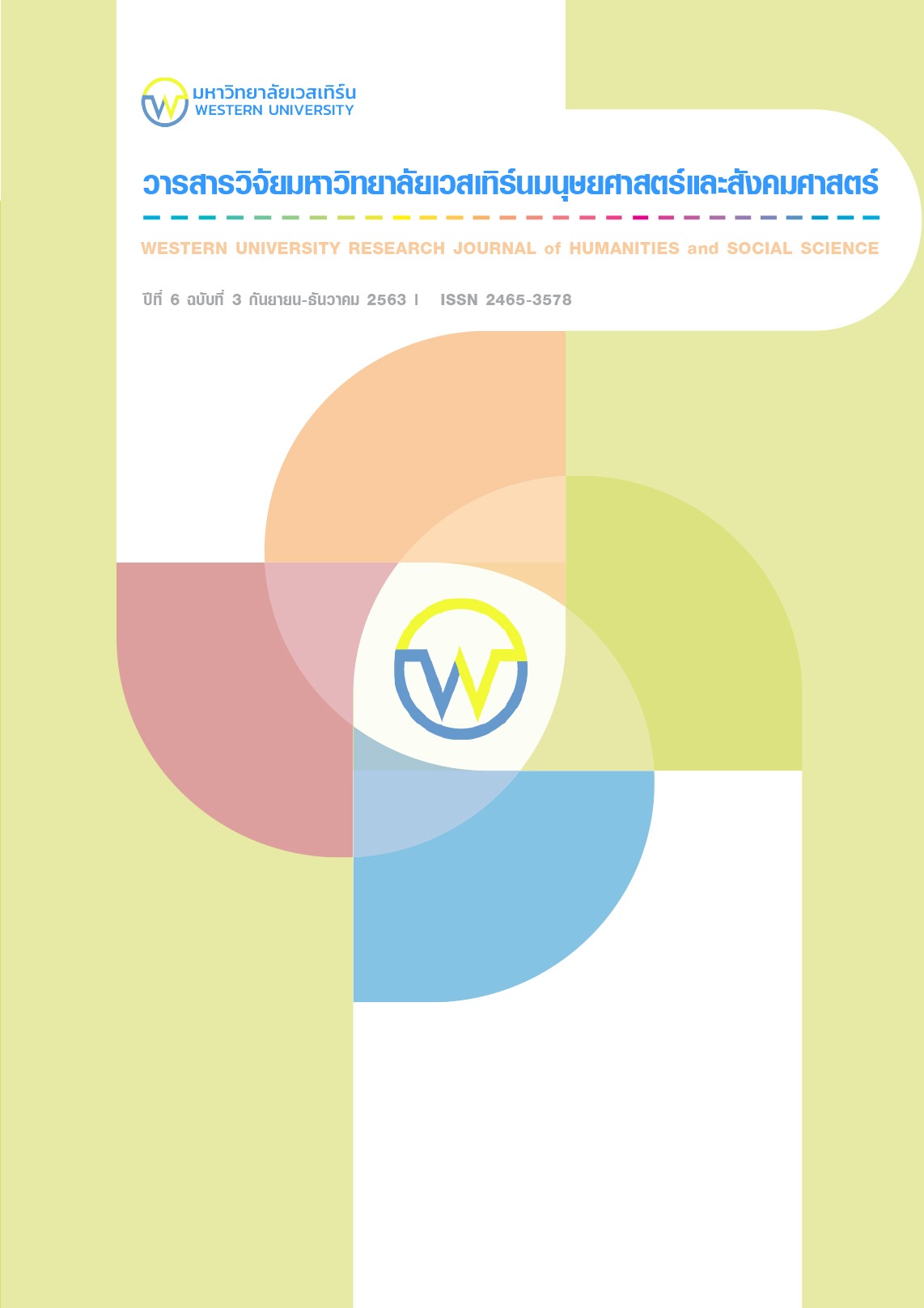Mobile Technology Acceptance and Online Behavior of Choice Use Food Ordering Service Through Consumer Application in Lampang Province
Main Article Content
Abstract
This study was aimed to study mobile technology acceptance and online behavior of choice use food ordering service through consumer application in Lampang province. The respondents were 347 consumers who used and previously used food ordering services such as Grab food and food panda in Lampang by using questionaries to collect data. Statistical techniques used included frequency, percentage, average, standard deviation and Multiple Regression. Research findings were as followed. 1) The overall opinion level of consumer mobile technology acceptance in Lampang province is at a high level. When considering each aspect, perceived usefulness had the highest average rating. Respectively, perceived ease of use and perceived compatibility were highly rated. 2) Overall, consumers behavior in choosing to use food ordering service via application in Lampang province was was high. Support from online emotions had the highest average rating. Respectively, effectiveness of information content and online entertainment highly rated. 3) Hypothesis testing was as followed. Mobile technology acceptance in perception of compatibility, online consumer behavior in online entertainment, emotional side online in terms of information efficiency, consumers’ choice of food ordering through applications in Lampang Province. With statistical significance at the .05 level. By jointly forecasting the choice of food ordering service through the application of consumers in Lampang Province accounted for 55.0 percent. The behavior of online consumer’s acceptance of mobile technology is one of the things entrepreneurs should be aware of and focus on. It is considered an important part of the world economy. In addition, consumers and retailers can use it in their operations as it is convenient, cost effective and efficient. By using the internet as a virtual medium that allows consumers to interact, comment and easy access to information.
Article Details
References
จิดาภา ทัดหอม (2558) . การตลาดผ่านสื่อสังคมออนไลน์ ความไว้วางใจและคุณภาพของระบบสารสนเทศที่มีผลต่อการตัดสินใจซื้อสินค้าผ่านช่องทางการถ่ายทอดสดเฟซบุ๊กไลฟ์ (Facebook Live) ของผู้บริโภคออนไลน์ในกรุงเทพมหานคร. ปริญญาบริหารธุรกิจบัณฑิต มหาวิทยาลัยกรุงเทพ
ณรงค์ศักดิ์ ปลอดมีชัย. (2562). การเติบโตของตลาดฟู้ด เดลิเวอรี. สืบค้นเมื่อวันที่ 5 สิงหาคม 2563, จาก https://www.posttoday.com/finance-stock/columnist/602101.
ณัฎฐนันท์ พิธิวัตโชติกุล (2558). การยอมรับเทคโนโลยีโทรศัพท์มือถือ การตลาดผ่านสื่อสังคมออนไลน์ และ พฤติกรรมผู้บริโภคออนไลน์ที่ส่งผลต่อความตั้งใจซื้อสินค้าออนไลน์ผ่านแอปพลิเคชันของผู้บริโภคในกรุงเทพมหานคร . ปริญญาบริหารธุรกิจมหาบัณฑิต มหาวิทยาลัยกรุงเทพ.
นธกฤต วันต๊ะเมล์. (2557). การสื่อสารการตลาด. กรุงเทพฯ: ภาควิชานิเทศศาสตร์และสารสนเทศศาสตร์ คณะมนุษยศาสตร์ มหาวิทยาลัยเกษตรศาสตร์.
วรรณิกา จิตตินรากร (2559). การยอมรับเทคโนโลยีและพฤติกรรมผู้บริโภคออนไลน์ที่ส่งผลต่อการตัดสินใจซื้อสินค้า. ปริญญาบริหารธุรกิจมหาบัณฑิต มหาวิทยาลัยกรุงเทพ.
วิริยาภรณ์ เตชะกฤตธีรพงศ์ (2558) .ปัจจัยการยอมรับการใช้งานเทคโนโลยีการทำงานร่วมกันของบุคลากรในองค์การ. ปริญญาวิทยาศาสตรมหาบัณฑิต (สาขาวิชาระบบสารสนเทศเพื่อการจัดการ
คณะพาณิชยศาสตร์และการบัญชี มหาวิทยาลัยธรรมศาสตร์.
สิทธิชัย ภูษาแก้ว (2560). ปัจจัยการยอมรับเทคโนโลยีที่มีผลต่อการตัดสินใจใช้บริการ Grab ของผู้บริโภคในกรุงเทพมหานคร .ปริญญาบริหารธุรกิจมหาบัณฑิต มหาวิทยาลัยกรุงเทพ.
สุทินา หิรัญประทีป. (2558). ประสิทธิผลของการสื่อสารการตลาดออนไลน์สำหรับกลุ่มเยาวชนของธุรกิจดนตรีในประเทศไทย. การค้นคว้าอิสระปริญญาบริหารธุรกิจมหาบัณฑิต. มหาวิทยาลัยกรุงเทพ.
สุรพล อิสรไกรศีล. (2563).“ราชบัณฑิตบัญญัติศัพท์ New normal ใช้ทับศัพท์ “นิวนอร์มัล” หรือ ความปรกติใหม่,” สืบค้นเมื่อว้นที่ 20 สิงหาคม 2563, จาก https://workpointtoday.comราชบัณฑิตบัญญัติศัพท์-new-normal.
สำนักงานพัฒนาธุรกรรมทางอิเล็กทรอนิกส์. (2559). “รายงานผลการสำรวจพฤติกรรมผู้ใช้อินเทอร์เน็ตของประเทศไทย ปี 2558”. สืบค้นเมื่อวันที่ 20 กันยายน 2563,จาก https://www.etda.or.th/publishing-detail/thailand-internet-user-profile-2015-th.html.
อัครเดช ปิ่นสุข. (2557). การยอมรับเทคโนโลยีสารสนเทศ คุณภาพการบริการอิเล็กทรอนิกส์ และส่วนประสมการตลาดในมุมมองของลูกค้าที่ส่งผลต่อความพึงพอใจ (E-satisfaction) ในการจองตั๋วภาพยนตร์
ออนไลน์ผ่านระบบแอพพลิเคชั่นของผู้ใช้บริการในจังหวัดกรุงเทพมหานคร. ปริญญาบริหารธุรกิจมหาบัณฑิต มหาวิทยาลัยกรุงเทพ.
Jirayu Limjinda. (2019). เมื่อคนไทย “ติดมือถือ” มากเป็นอันดับหนึ่งของโลก. สืบค้นเมื่อวันที่ 15 กรกฎาคม 2563, จาก https://medium.com/@jir4yu.
Ooi, K.B. and Tan, G. W. H. (2016). Mobile technology acceptance model: an investigation using mobile users to explore smartphone credit card. Journal of Expert systems
with application. 59, 33-46.
Richard, M. O., & Chebat, J. C. (2016). Modeling online consumer behavior: Preeminence of emotions and moderating influences of need for cognition and optimal stimulation level. Journal of Business Research, 69, 541–553
Taro Yamane. (1973). Statistics: An Introductory Analysis. 3rd ed. New York: Harper and Row Pub.


